Spice soup is more than just a dish—it's a celebration of flavor, culture, and creativity. Whether you're a seasoned chef or a home cook with a passion for bold tastes, spice soup offers endless possibilities. From the fiery heat of chili to the earthy depth of cumin, each ingredient tells a story. In this article, we'll explore the basics of spice soup, give you practical tips, and help you find your perfect match.
| Spice | Features | Best For | Occasions |
|---|---|---|---|
| Chili Powder | Smoky, spicy, and versatile | Mexican, Tex-Mex, and Indian dishes | Weeknight dinners, game day snacks |
| Cumin | Earthy, nutty, and warming | Mexican, Middle Eastern, and Indian cuisines | Dinner parties, festive meals |
| Cayenne Pepper | Heat and intensity | Hot and spicy dishes | Spice challenges, adventurous eating |
| Ginger | Warm, zesty, and aromatic | Asian, Indian, and fusion recipes | Breakfast, lunch, and dinner |
| Coriander | Lemony, citrusy, and fresh | Indian, Mediterranean, and Middle Eastern cooking | Family meals, cultural celebrations |
What Is Spice Soup?
Spice soup is a versatile and aromatic dish that uses a combination of spices to create rich, layered flavors. It can be based on broths, stews, or even creamy sauces, depending on the cuisine and personal preference. The key lies in the balance of spices—each one contributes to the overall taste profile, making it a culinary adventure for the senses.
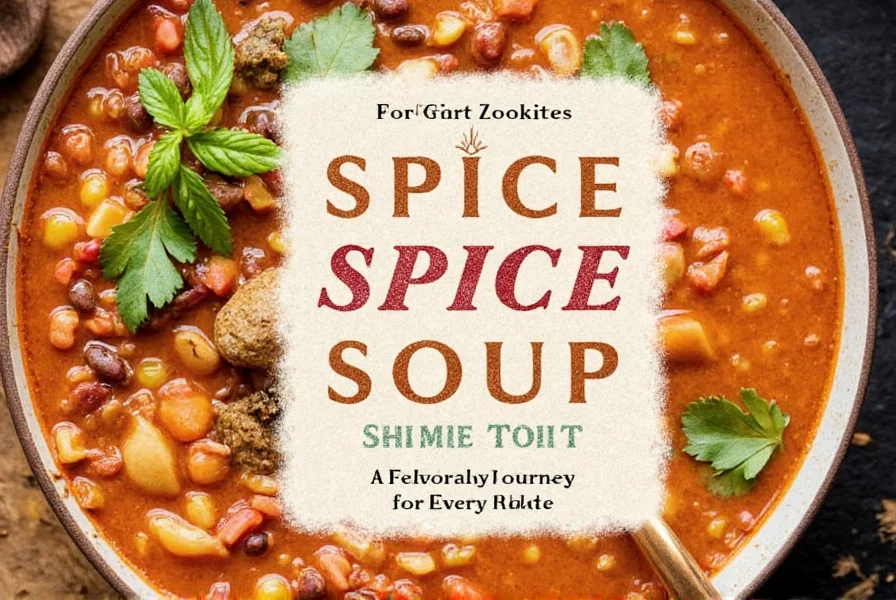
Whether you're looking for a comforting meal or a bold new flavor experience, spice soup has something for everyone. Let's dive into the world of spices and discover how they bring life to this beloved dish.
Benefits of Spice Soup
Spice soup isn't just about flavor—it also brings a host of health benefits. Many spices used in spice soup are known for their anti-inflammatory, digestive, and metabolism-boosting properties. For example:
- Ginger: aids digestion and reduces nausea.
- Cumin: supports gut health and enhances nutrient absorption.
- Cayenne Pepper: boosts metabolism and provides pain relief.
These natural ingredients not only enhance the taste but also contribute to overall well-being. Plus, spice soup is an excellent way to experiment with new flavors while keeping your meals interesting and nutritious.
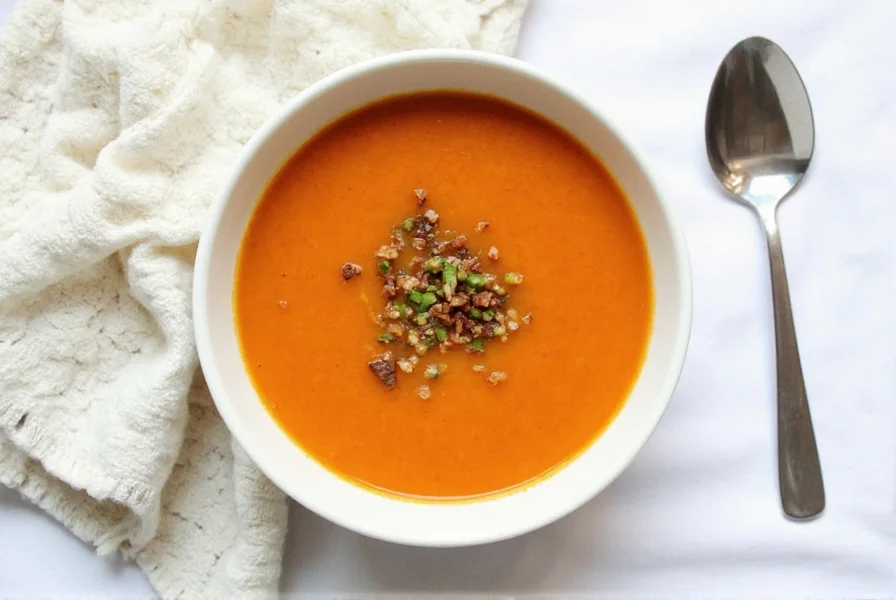
How to Make Spice Soup
Making spice soup is easier than you think. Here's a simple guide to get you started:
- Choose Your Base: Start with a broth, vegetable stock, or even a creamy base like coconut milk.
- Add Aromatics: Sauté onions, garlic, and ginger to build a strong flavor foundation.
- Layer the Spices: Add your favorite spices in stages to allow their flavors to develop.
- Simmer and Taste: Let the soup simmer for at least 20–30 minutes, tasting as you go to adjust the seasoning.
- Finish with Fresh Herbs: Top with cilantro, parsley, or green onions for a burst of freshness.
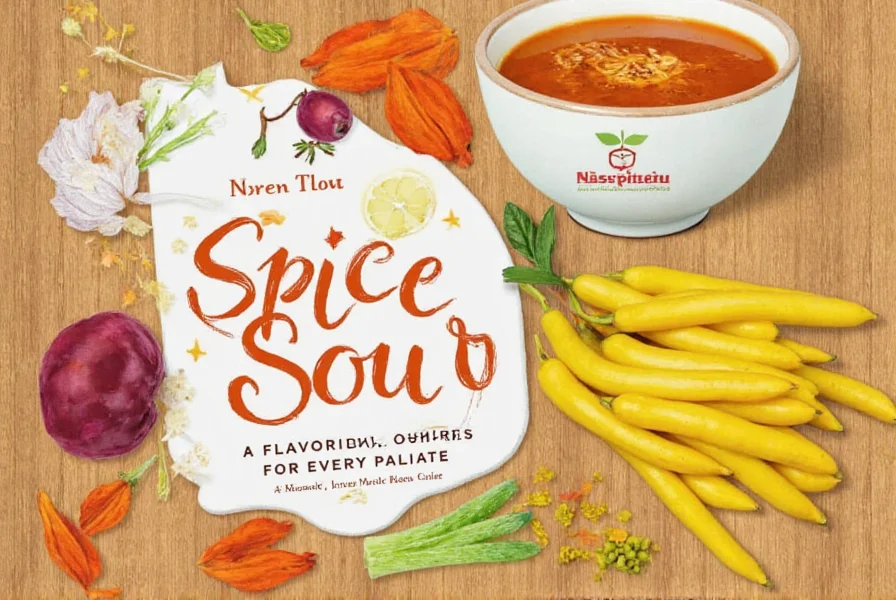
This basic method can be adapted to suit any flavor profile. Experiment with different combinations to find what works best for you.
Spice Soup Tips for Beginners
If you're new to spice soup, here are some helpful tips to keep in mind:
- Start Small: Use a little bit of spice at first, and add more gradually.
- Use Whole Spices: Whole spices like cumin seeds or cinnamon sticks release more flavor when cooked.
- Balance Flavors: Don't forget to add salt, acid (like lemon juice), or sweetness (like honey) to balance the spices.
- Store Properly: Store unused spices in airtight containers away from light and heat to maintain potency.

With these tips, you'll be able to create delicious and balanced spice soups without overwhelming your taste buds.
Spice Soup Recipes to Try
Ready to put your knowledge to the test? Here are a few popular spice soup recipes to try:
1. Spicy Tomato and Chickpea Soup
This hearty and flavorful soup is perfect for a cozy evening. The combination of tomatoes, chickpeas, and warm spices makes it both satisfying and nutritious.
2. Thai Green Curry Soup
For those who love bold and aromatic flavors, Thai green curry soup is a must-try. It features a mix of herbs, chilies, and coconut milk for a creamy and spicy kick.
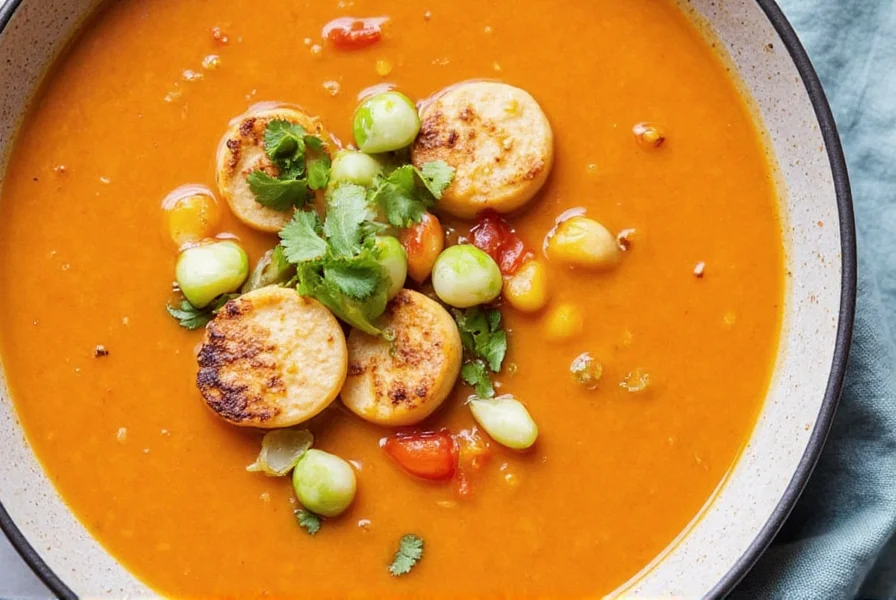
3. Mexican Spiced Bean Soup
A vegetarian-friendly option that delivers big flavor. This soup uses a blend of beans, tomatoes, and spices for a rich and comforting meal.
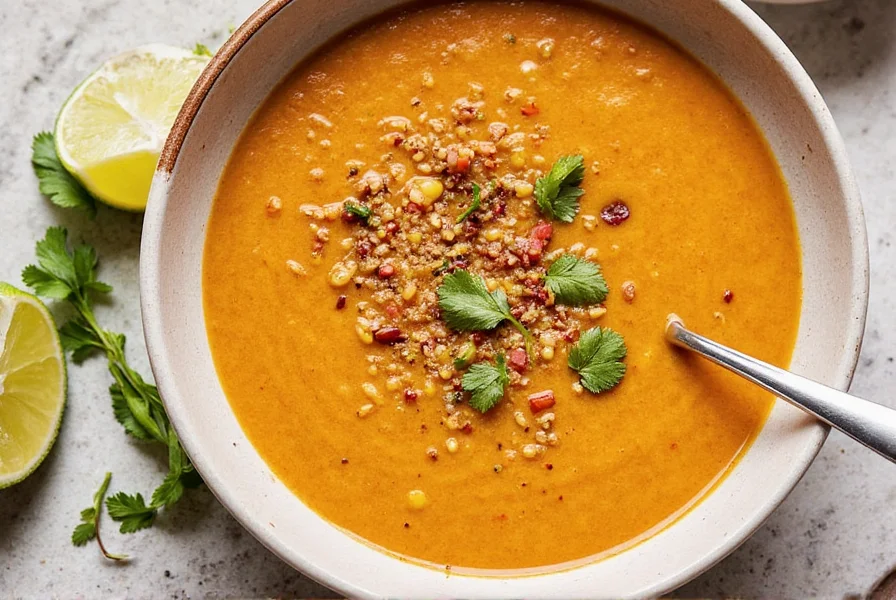
Each of these recipes showcases how different spices can transform a simple soup into something extraordinary.
Spice Soup FAQ
What is the best spice for soup?
The "best" spice depends on your flavor preferences and the type of soup you're making. For general soup enhancement, cumin offers earthy depth, while smoked paprika adds warmth without excessive heat. Bay leaves are excellent for building foundational flavor in most soups. For beginners, starting with a spice blend like garam masala or za'atar can provide balanced flavor without having to measure multiple individual spices.
How do I balance spices in soup?
Balance spices by adding them gradually and tasting as you go. Start with smaller amounts (1/4 to 1/2 teaspoon per spice for a standard pot of soup), then adjust. Remember the five elements of balance: salt (enhances all flavors), acid (lemon juice or vinegar brightens), sweetness (a pinch of sugar or honey counters acidity), heat (spices like cayenne), and umami (ingredients like tomato paste or soy sauce). If spices become too strong, add more broth or a dairy component like coconut milk to mellow the flavors.
Can I make spice soup vegetarian or vegan?
Absolutely! Many spice soups are naturally vegetarian or can be easily adapted. Use vegetable broth as your base instead of meat-based broths. For protein, add beans, lentils, chickpeas, or tofu. To maintain richness without dairy, use coconut milk or cashew cream. Most traditional spice blends (like curry powder, garam masala, or berbere) are plant-based, but always check labels if you're strictly vegan.
How long does spice soup keep in the refrigerator?
Properly stored in an airtight container, spice soup will keep in the refrigerator for 3-4 days. Many spice soups actually taste better the next day as the flavors have more time to meld. When reheating, do so gently over medium-low heat to preserve the delicate spice flavors. For optimal flavor retention, store the soup without fresh garnishes (like herbs or dairy), which should be added when serving.
What are the health benefits of spice soup?
Spice soups offer numerous health benefits depending on the spices used. Turmeric contains curcumin (anti-inflammatory), ginger aids digestion, cumin may improve iron absorption, and cinnamon can help regulate blood sugar. Many spices are rich in antioxidants and can boost metabolism. The vegetable content in most spice soups provides fiber and essential vitamins, making them both nourishing and healing, especially when you're feeling under the weather.
Can I freeze spice soup?
Yes, most spice soups freeze exceptionally well for up to 3 months. Cool the soup completely before transferring to freezer-safe containers, leaving about an inch of space for expansion. Soups with coconut milk or cream may separate slightly when thawed but will recombine with gentle reheating. Avoid freezing soups with potatoes as they can become grainy. Label containers with the date and type of soup for easy identification later.
How can I reduce the spiciness if I added too much?
If your soup becomes too spicy, there are several ways to mellow it: add more broth or coconut milk to dilute the heat, stir in a tablespoon of sugar or honey to counteract the spiciness, or add dairy like yogurt or cream (for non-vegan options). Acidic ingredients like lemon juice or tomato can also help balance excessive heat. Remember that spice levels often mellow slightly as the soup sits, so wait 10-15 minutes before making further adjustments.
Conclusion
Spice soup is a fantastic way to explore the world of flavors and aromas. With the right combination of spices, you can create a dish that warms your soul and excites your palate. Whether you're a beginner or an experienced cook, there's always something new to learn and try.
Remember, the key to great spice soup is balance. Don't be afraid to experiment, taste as you go, and have fun with it. After all, the best soups are the ones that make you smile—and maybe even crave another bowl.

So, grab your favorite spices, gather your ingredients, and let the magic begin. Who knows? Your next favorite dish might just be a pot of spice soup waiting to be discovered.










 浙公网安备
33010002000092号
浙公网安备
33010002000092号 浙B2-20120091-4
浙B2-20120091-4